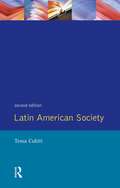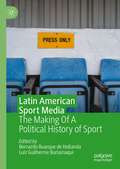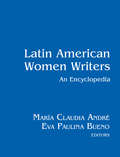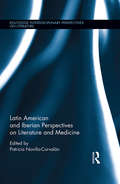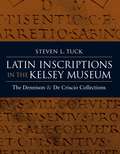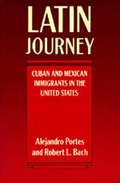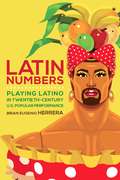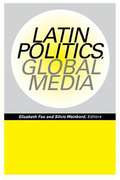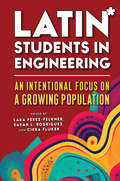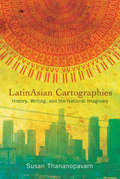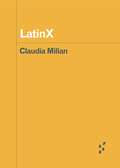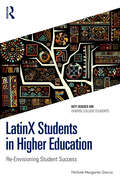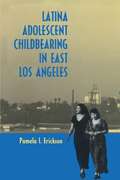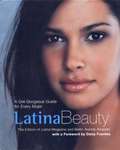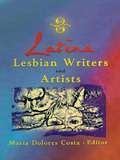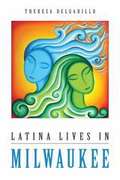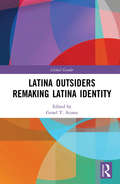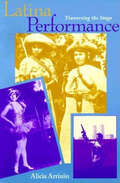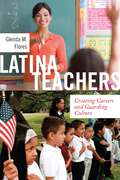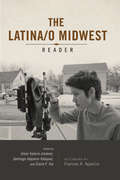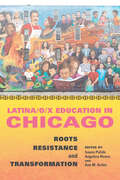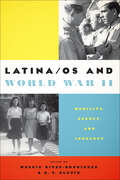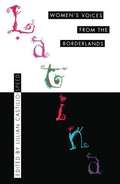- Table View
- List View
Latin American Society
by Tessa CubittFirst published in 1995. Routledge is an imprint of Taylor & Francis, an informa company.
Latin American Sport Media: The Making Of A Political History of Sport
by Bernardo Buarque de Hollanda Luiz Guilherme BurlamaquiThis book provides an historical overview of the formation of sports media in Latin America and its role in the construction of the political history of Latin American sport. The sports press was a privileged observer of the development of modern sports, but it was also a key factor in the making of professional sports in Latin America. Most of the literature on sport in Latin America treats the sports press as an historical source, rarely taking it as an object of study in itself. However, the development of sports in the region is connected to national and state-building processes and the role of media narratives is crucial to understanding how sports participate in those processes. Spanning the globalization of football in the late nineteenth century to the shift promoted by television in the 1970s, the chapters survey the historical development of sports media in Latin America. Representing ten countries, the contributors follow a framework that presents the press not as a passive narrator of the sports phenomenon, but as a social agent of the sports field. This book is of use to those interested in the history of sports and the media, and it will be a good resource for undergraduates taking courses on Sports History, Latin American History, Sports Management, and Journalism and Communication.
Latin American Women Writers: An Encyclopedia
by Eva Paulino Bueno MarLatin American Women Writers: An Encyclopedia presents the lives and critical works of over 170 women writers in Latin America between the sixteenth and twentieth centuries. This features thematic entries as well as biographies of female writers whose works were originally published in Spanish or Portuguese, and who have had an impact on literary, political, and social studies.Focusing on drama, poetry, and fiction, this work includes authors who have published at least three literary texts that have had a significant impact on Latin American literature and culture. Each entry is followed by extensive bibliographic references, including primary and secondary sources.Coverage consists of critical appreciation and analysis of the writers' works. Brief biographical data is included, but the main focus is on the meanings and contexts of the works as well as their cultural and political impact. In addition to author entries, other themes are explored, such as humor in contemporary Latin American fiction, lesbian literature in Latin America, magic, realism, or mother images in Latin American literature. The aim is to provide a unique, thorough, scholarly survey of women writers and their works in Latin America. This Encyclopedia will be of interest to both to the student of literature as well as to any reader interested in understanding more about Latin American culture, literature, and how women have represented gender and national issues throughout the centuries.
Latin American and Iberian Perspectives on Literature and Medicine (Routledge Interdisciplinary Perspectives on Literature)
by Patricia Novillo-CorvalánThis is the first study to examine the representation of illness, disability, and cultural pathologies in modern and contemporary Iberian and Latin American literature. Innovative and interdisciplinary, the collection situates medicine as an important and largely overlooked discourse in these literatures, while also considering the social, political, religious, symbolic, and metaphysical dimensions underpinning illness. Investigating how Hispanic and Lusophone writers have reflected on the personal and cultural effects of illness, it raises central questions about how medical discourses, cultural pathologies, and the art of healing in general are represented. Essays pay particular attention to the ways in which these interdisciplinary dialogues chart new directions in the study of Hispanic and Lusophone cultures, and emerging disciplines such as the medical humanities. Addressing a wide range of themes and subjects including bioethics, neuroscience, psychosurgery, medical technologies, Darwinian evolution, indigenous herbal medicine, the rising genre of the pathography, and the ‘illness as metaphor’ trope, the collection engages with the discourses of cultural studies, gender studies, disability studies, comparative literature, and the medical humanities. This book enriches and stimulates scholarship in these areas by showing how much we still have to gain from interdisciplinary studies working at the intersections between the humanities and the sciences.
Latin Inscriptions in the Kelsey Museum
by Steven L. TuckThe Latin inscriptions in the Kelsey Museum are among the best primary sources we have for documenting the lives of the lower classes in the Roman world. They provide unique evidence of the details of Roman daily life, including beliefs, occupations, families, and attitudes toward death. The 400 entries in this volume include all of the Latin inscriptions on stone or metal in the Kelsey Museum of Archaeology at the University of Michigan; they represent the largest, and arguably the most important, collection of Latin inscriptions in the Western Hemisphere. The collection is notable not just for its size but for the fact that almost all the inscriptions were acquired by purchase for their scholarly and educational value to the members of the university community. Because of this, the collection is also an important testimony to a seminal phase in the development of the study of Classics at the University of Michigan. For the first time ever, this project makes the Latin inscriptions of the Kelsey available in one volume and has provided an opportunity to reexamine some texts that have not been edited in over a century. The commentaries for this edition have benefited from a wealth of recent scholarship resulting in some amended readings and reidentification of texts.
Latin Journey: Cuban and Mexican Immigrants in the United States
by Alejandro Portes Robert L. BachLatin Journey details an eight-year study of Mexican and Cuban immigrants to the U.S.
Latin Kingdom Of Jerusalem: 1099 To 1291 A. D (classic Reprint)
by ConderFirst published in 2006. Routledge is an imprint of Taylor & Francis, an informa company.
Latin Numbers: Playing Latino In Twentieth-century U. S. Popular Performance
by Brian Eugenio HerreraLatin Numbers is a work of performance history, examining the way in which Latino actors on the twentieth-century stage and screen communicated and influenced American ideas about race and ethnicity. Brian Eugenio Herrera looks at how these performances and performers contributed to American popular understanding of Latinos as a distinct racial and ethnic group. His book tracks the conspicuously "Latin" musical number; the casting of Latino actors; the history of West Side Story; how Latina/o performers confront stereotypes; and the proliferation of the gay Latino character in the AIDS era. With a flair for storytelling and a unique ability to see the deeper meanings embedded in popular culture, Herrera creates a history that will appeal to popular culture enthusiasts, theater aficionados, and those interested in the cultural history of Latinos. The book will also delight readers interested in the memorable (and many of the lesser-known) Latino performances on stage and screen.
Latin Politics, Global Media
by Silvio Waisbord Elizabeth FoxThe globalization of media industries that began during the 1980s and 1990s occurred at the same time as the establishment of or return to democratic forms of government in many Latin American countries.<P><P> In this volume of specially commissioned essays, thirteen well-known media experts examine how the intersection of globalization and democratization has transformed media systems and policies throughout Latin America. <P> Following an extensive overview by editors Elizabeth Fox and Silvio Waisbord, the contributors investigate the interaction of local politics and global media in individual Latin American countries. Some of the issues they discuss include the privatization and liberalization of the media, the rise of media conglomerates, the impact of trade agreements on media industries, the role of the state, the mediazation of politics, the state of public television, and the role of domestic and global forces. The contributors address these topics with a variety of theoretical approaches, combining institutional, historical, economic, and legal perspectives.
Latin* Students in Engineering: An Intentional Focus on a Growing Population
by Taryn Ozuna Allen Christine Hall Diana Garza Michael Perez Tonisha B. Lane Maria L Espino Morgan Nichols Brian D Le Blanca Rincón René Hernandez Erin Doran Elizabeth Turochy Cristina Poleacovschi Timothy Yuen Dina Verdín Renata Revelo Janice Mejía Da'Shay Portis Templeton Hector E Rodriguez-Simmonds Leonardo Pollettini Marcos Cristián Vargas-Ordóñez Kevin Jay Kaufman-Ortiz Selyna Pérez Beverly Lisa R Lattuca Courtney Matthews Lisette E Torres Krystal Peralez Elsa Gonzalez Emma Claudia Perez Adriana Facundo Ulises Trujillo Garcia Esther EnrightThe growing population of engineering students who identify as Latin* are underrepresented in the field of engineering. Latin* refers to an individual of Latin American origin or descent, without restricting to a specific gender. The asterisk (*) includes related identity terms such as Latina/é/o/u/x.There is, however, a rising need to train U.S. students in engineering skills to meet the demands of our increasingly technological workforce. Structurally excluding Latin* students hinders their economic and educational opportunities in engineering. Latin* Students in Engineering examines the state of Latin* engineering education at present as well as considerations for policy and practice regarding engineering education aimed at enhancing opportunity and better serving Latin* students. The essays in this volume first consider, theoretically and empirically, the experiences of Latin* students in engineering education and then expand beyond the student level to focus on institutional and social structures that challenge Latin* students' success and retention. Finally, it illuminates emergent work and considers future research, policy, and practice.
LatinAsian Cartographies: History, Writing, and the National Imaginary (Latinidad: Transnational Cultures in the United States)
by Susan ThananopavarnLatinAsian Cartographies examines how Latina/o and Asian American writers provide important counter-narratives to the stories of racial encroachment that have come to characterize twenty-first century dominant discourses on race. Susan Thananopavarn contends that the Asian American and Latina/o presence in the United States, although often considered marginal in discourses of American history and nationhood, is in fact crucial to understanding how national identity has been constructed historically and continues to be constructed in the present day. Thananopavarn creates a new “LatinAsian” view of the United States that emphasizes previously suppressed aspects of national history, including imperialism, domestic racism during World War II, Cold War operations in Latin America and Asia, and the politics of borders in an age of globalization. LatinAsian Cartographies ultimately reimagines national narratives in a way that transforms dominant ideas of what it means to be American.
LatinX (Forerunners: Ideas First)
by Claudia MilianNationality is not enough to understand &“Latin&”-descended populations in the United States LatinX has neither country nor fixed geography. LatinX, according to Claudia Milian, is the most powerful conceptual tool of the Latino/a present, an itinerary whose analytic routes incorporate the Global South and ecological devastation. Milian&’s trailblazing study deploys the indeterminate but thunderous &“X&” as intellectual armor, a speculative springboard, and a question for our times that never stops being asked. LatinX sorts out and addresses issues about the unknowability of social realities that exceed our present knowledge.Forerunners: Ideas FirstShort books of thought-in-process scholarship, where intense analysis, questioning, and speculation take the lead
LatinX Students in Higher Education: Re-Envisioning Student Success (Key Issues on Diverse College Students)
by Nichole Margarita GarciaThe most recent addition to the “Key Issues on Diverse College Students” series, this important volume bridges theory to practice in order to help higher education professionals support LatinX students in colleges and universities. LatinX Students in Higher Education challenges the traditional metrics of student success in higher education for LatinX students, offering a revised definition of student success to re-envision the skills and abilities that these students bring from their communities into institutions of higher education and community-based settings. Garcia’s powerful counter-story narratives shed light on the urgent need for systemic reform, and ultimately this book challenges institutions to adopt more inclusive and anti-racist practices that honor cultural identity, community, and resilience. This is a must-read for researchers, educators, student affairs professionals, students, and policymakers committed to creating an equitable higher education system and promoting the success of LatinX populations in higher education.
Latina Adolescent Childbearing in East Los Angeles
by Pamela I. EricksonPreventing teen pregnancy has become a national goal, but a one-size-fits-all strategy for achieving it may never be found. Because varying social and cultural factors lead to pregnancy among different ethnic/class groups, understanding these factors is essential in designing pregnancy prevention programs that work. This book explores the factors that lead to childbearing among Latina adolescents.<P><P>Pamela Erickson draws on both quantitative data and case histories to trace the pathways to motherhood for Latina teens. After situating her study within current research on teen pregnancy, she looks specifically at teen mothers enrolled in programs at Women's Hospital in East L.A. She describes the teens' relationships to their babies' fathers and their own families and discusses how these relationships affect whether teen mothers want to become pregnant, their use of prenatal, postpartum, and family planning services, and their ability to prevent a repeat pregnancy. Erickson describes culturally appropriate intervention efforts and assesses the limitations of prevention programs in institutional settings such as schools and clinics.
Latina Beauty: A Get Gorgeous Guide for Every Mujer
by Belen Aranda-Alvarado Christy Haubegger"Latina" magazine presents the first total beauty guide exclusively for the rapidly expanding market of Hispanic women. Packed with information, inspiration, and celebrity insight, "Latina Beauty" celebrates what makes Hispanic women so distinct, so powerful, and so beautiful.
Latina Lesbian Writers and Artists
by Maria Dolores CostaExplore a little-known side of the lesbian artistic world! With this book, you&’ll explore the work of the most significant contemporary Latina lesbian writers, artists, and performers in the United States, Latin America, and Spain. This book presents and analyzes literature, art, and poetry by women who, despite markedly different backgrounds and experiences, are all strongly influenced by the concept of lesbian identity. Latina Lesbian Writers and Artists begins with an essential A-to-Z overview of modern Latina lesbian authors and performers. From Cuban writer Magaly Alabau to literary critic Yvonne Yarbro-Bejarano, you&’ll learn who these women are, where they&’re from, and what they&’ve chosen as the focus of their work. The rest of the book is structured to give you a look at the work Latina lesbians in the United States and then moves geographically outward, first to Latin America, then to Spain. "Tortilleras on the Prairie: Latina Lesbians Writing the Midwest" provides a unique look at a much-neglected component of Latina lesbian writing-that of the Latinas living far from the East and West Coast hubs of both Latino and queer cultures, exploring Latina lesbian literary production in places like Kansas and Nebraska. "The Role of Carmelita Tropicana in the Performance Art of Alina Troyano," appraises the imaginative, hilarious, and insightful work of Cuban-American performance artist Alina Troyano (better known by her stage name, Carmelita Tropicana), examining the strategies she used (code switching, the breaking of heterosexist norms, the development of alter-egos, and more) to create a hybrid identity as an artist and performer. "Moving La Frontera Toward a Genuine Radical Democracy in Gloria Anzaldúa&’s Work" shows us how Anzaldúa&’s pivotal work Borderlands has revolutionized academic perceptions of the border and of identity in Latin American/U.S. Latino literature. You&’ll also find passionate poetry created by Latina lesbians. "Como Sabes, Depresión" is a fragment of a passionate bilingual poem written by an English-speaking poet enamored of the Spanish language, and "To Sor Juana" is a poem dedicated to the seventeenth century poet and nun who has become an icon among Latina lesbians. "Lesbianism and Caricature in Griselda Gambaro&’s Lo impenetrable" shows how lesbian characters and themes in the works of this Argentine novelist are used to satirize and undermine the perverse social values of patriarchal dictatorship. "The (In)visible Lesbian: The Contradictory Representations of Female Homoeroticism in Contemporary Spain" introduces us to some of Spain&’s lesbian authors and communicates the difficulties lesbian writers in that country and around the world have had in finding a receptive audience.
Latina Lives in Milwaukee
by Theresa DelgadilloMilwaukee's small but vibrant Mexican and Mexican American community of the 1920s grew over succeeding decades to incorporate Mexican, Mexican American, Puerto Rican, Cuban, Central American, and Caribbean migration to the city. Drawing on years of interviews and collaboration with interviewees, Theresa Delgadillo offers a set of narratives that explore the fascinating family, community, work, and career experiences of Milwaukee's Latinas during this time of transformation. Through the stories of these women, Delgadillo caringly provides access to a wide variety of Latina experiences: early Mexican settlers entering careers as secretaries and entrepreneurs; Salvadoran and Puerto Rican women who sought educational opportunity in the U.S., sometimes in flight from political conflicts; Mexican women becoming leather workers and drill press operators; and second-generation Latinas entering the professional classes. These women show how members of diverse generations, ethnicities, and occupations embraced interethnic collaboration and coalition but also negotiated ethnic and racial discrimination, domestic violence, workplace hostilities, and family separations. A one-of-a-kind collection, Latina Lives in Milwaukee sheds light on the journeys undertaken then and now by Latinas in the region, and lays the foundation for the further study of the Latina experience in the Midwest. With contributions from Ramona Arsiniega, María Monreal Cameron, Daisy Cubías, Elvira Sandoval Denk, Rosemary Sandoval Le Moine, Antonia Morales, Carmen Murguia, Gloria Sandoval Rozman, Margarita Sandoval Skare, Olga Valcourt Schwartz, and Olivia Villarreal.
Latina Outsiders Remaking Latina Identity (Global Gender)
by Grisel Y. AcostaLatina Outsiders Remaking Latina Identity is an exploration of Latinas on the periphery of both Latina culture and mainstream culture in the United States. Whether they are deliberately rejected or whether they choose to reject sexist, classist, or racist practices within their cultures, the subjects of these articles, essays, short fiction, poems, testimonios, and visual art demonstrate the value of their experience. Ultimately, the outsider experience influences what the larger culture adopts, demonstrating that a different perspective is key to remaking Latina identity. Outside perspectives include those of queer, indigenous, Afro-Latina, activist, and differently-abled individuals. By challenging stereotypes and revealing the diverse range of narratives that make up the Latina experience, Latina Outsiders Remaking Latina Identity will expand and deepen notions of the Latina identity for students and researchers of Women’s, Gender and Sexuality Studies.
Latina Performance: Traversing the Stage
by Alicia ArrizónA study exploring the role of Latina women in theater performance, literature, and criticism.Arrizón’s examination of Latina performance spans the twentieth century, beginning with oral traditions of corrido and revistas. She examines the soldadera and later theatrical personalities such as La Chata Noloesca and contemporary performance artist Carmelita Tropicana.Latina Performance considers the emergence of Latina aesthetics developed in the United States, but simultaneously linked with Latin America. As dramatists, performance artists, protagonists, and/or cultural critics, the women Arrizón examines in this book draw attention to their own divided position. They are neither Latin American nor Anglo, neither third- or first-world; they are feminists, but not quite “American style.” This in-between-ness is precisely what has created Latina performance and performance studies, and has made “Latina” an allegory for dual national and artistic identities.“Alicia Arrizón’s Latina Performance is a truly innovative and important contribution to Latino Studies as well as to theater and performance studies.” —Diana Taylor, New York University“Arrizón’s . . . important book revolves around the complex issues of identity formation and power relations for US women performers of Latin American descent. . . . Valuable for anyone interested in theater history and criticism, cultural studies, gender studies, and ethnic studies with attention to Mexican American, Chicana/o, and Latina/o studies. Upper—division undergraduates through professionals.” —E. C. Ramirez, Choice
Latina Teachers: Creating Careers and Guarding Culture (Latina/o Sociology #3)
by Glenda M. FloresWinner, 2018 Outstanding Contribution to Scholarship Book Award presented by the American Sociological Association's Section on Race, Class, and GenderHonorable Mention, 2018 Distinguished Contribution to Research Book Award presented by the American Sociological Association's Latina/o Sociology SectionHow Latina teachers are making careers and helping students stay in touch with their roots.Latina women make up the fastest growing non-white group entering the teaching profession at a time when it is estimated that 20% of all students nationwide now identify as Latina/o. Through ethnographic and participant observation in two underperforming majority-minority schools in Los Angeles, as well as interviews with teachers, parents and staff, Latina Teachers examines the complexities stemming from a growing workforce of Latina teachers. The teachers profiled use Latino cultural resources and serve as agents of ethnic mobility. They actively teach their students how to navigate American race and class structures while retaining their cultural roots, necessary tactics in an American education system that has not fully caught up with the nation’s demographic changes. Flores also explores the challenges faced by Latina teachers, including language barriers and cultural acclimation, and professional inequalities that continue to affect women of color at work. An unprecedented look at an understudied population, Latina Teachers presents an important picture of the women who are increasingly shaping the way America’s children are educated.
Latina/o Midwest Reader
by Omar Valerio-Jimenez Santiago Vaquera-VasquezFrom 2000 to 2010, the Latino population increased by more than 73 percent across eight midwestern states. These interdisciplinary essays explore issues of history, education, literature, art, and politics defining today’s Latina/o Midwest. Some contributors delve into the Latina/o revitalization of rural areas, where communities have launched bold experiments in dual-language immersion education while seeing integrated neighborhoods, churches, and sports teams become the norm. Others reveal metro areas as laboratories for emerging Latino subjectivities, places where for some, the term Latina/o itself corresponds to a new type of lived identity as different Latina/o groups interact in shared neighborhoods, schools, and workplaces. Eye-opening and provocative, The Latina/o Midwest Reader rewrites the conventional wisdom on today's Latina/o community and how it faces challenges—and thrives—in the heartland. Contributors: Aidé Acosta, Frances R. Aparicio, Jay Arduser, Jane Blocker, Carolyn Colvin, María Eugenia Cotera, Theresa Delgadillo, Lilia Fernández, Claire F. Fox, Felipe Hinojosa, Michael D. Innis-Jiménez, José E. Limón, Marta María Maldonado, Louis G. Mendoza, Amelia María de la Luz Montes, Kim Potowski, Ramón H. Rivera-Servera, Rebecca M. Schreiber, Omar Valerio-Jiménez, Santiago Vaquera-Vásquez, Darrel Wanzer-Serrano, Janet Weaver, and Elizabeth Willmore
Latina/o/x Education in Chicago: Roots, Resistance, and Transformation (Latinos in Chicago and Midwest)
by Nilda Flores-González Lilia Fernández Jaime Alanís Ann M Avilés Gabriel Alejandro Cortez Erica R Dávila Cristina Pacione-Zayas Isaura Pulido Angelica Rivera Arlene Torres Mirelsie Velázquez Leticia Villarreal SosaIn this collection, local experts use personal narratives and empirical data to explore the history of Mexican American and Puerto Rican education in the Chicago Public Schools (CPS) system. The essays focus on three themes: the historical context of segregated and inferior schooling for Latina/o/x students; the changing purposes and meanings of education for Latina/o/x students from the 1950s through today; and Latina/o/x resistance to educational reforms grounded in neoliberalism. Contributors look at stories of student strength and resistance, the oppressive systems forced on Mexican American women, the criminalization of Puerto Ricans fighting for liberatory education, and other topics of educational significance. As they show, many harmful past practices remain the norm--or have become worse. Yet Latina/o/x communities and students persistently engage in transformative practices shaping new approaches to education that promise to reverberate not only in the city but nationwide. Insightful and enlightening, Latina/o/x Education in Chicago brings to light the ongoing struggle for educational equity in the Chicago Public Schools.
Latina/os and World War II: Mobility, Agency, and Ideology
by Maggie Rivas-RodríguezThis eye-opening anthology documents the effects of WWII on Latina/o personal and political beliefs across a broad spectrum of ethnicities and races.The first book-length study of Latina/o experiences in World War II over a wide spectrum of identities and ancestries—from Cuban American, Spanish American, and Mexican American segments to the under-studied Afro-Latino experience—Latina/os and World War II probes the controversial aspects of Latina/o soldiering and citizenship in the war, the repercussions of which defined the West during the twentieth century. The editors also offer a revised, more accurate tabulation of the number of Latina/os who served in the war.Spanning imaginative productions, such as vaudeville and the masculinity of the soldado razo theatrical performances; military segregation and the postwar lives of veterans; Tejanas on the homefront; journalism and youth activism; and other underreported aspects of the wartime experience, the essays collected in this volume showcase rarely seen recollections. Whether living in Florida in a transformed community or deployed far from home (including Mexican Americans who were forced to endure the Bataan Death March), the men and women depicted in this collection yield a multidisciplinary, metacritical inquiry. The result is a study that challenges celebratory accounts and deepens the level of scholarly inquiry into the realm of ideological mobility for a unique cultural crossroads. Taking this complex history beyond the realm of war narratives, Latina/os and World War II situates these chapters within the broader themes of identity and social change that continue to reverberate in postcolonial lives.
Latina/os and World War II: Mobility, Agency, and Ideology
by Maggie Rivas-RodríguezThis eye-opening anthology documents the effects of WWII on Latina/o personal and political beliefs across a broad spectrum of ethnicities and races.The first book-length study of Latina/o experiences in World War II over a wide spectrum of identities and ancestries—from Cuban American, Spanish American, and Mexican American segments to the under-studied Afro-Latino experience—Latina/os and World War II probes the controversial aspects of Latina/o soldiering and citizenship in the war, the repercussions of which defined the West during the twentieth century. The editors also offer a revised, more accurate tabulation of the number of Latina/os who served in the war.Spanning imaginative productions, such as vaudeville and the masculinity of the soldado razo theatrical performances; military segregation and the postwar lives of veterans; Tejanas on the homefront; journalism and youth activism; and other underreported aspects of the wartime experience, the essays collected in this volume showcase rarely seen recollections. Whether living in Florida in a transformed community or deployed far from home (including Mexican Americans who were forced to endure the Bataan Death March), the men and women depicted in this collection yield a multidisciplinary, metacritical inquiry. The result is a study that challenges celebratory accounts and deepens the level of scholarly inquiry into the realm of ideological mobility for a unique cultural crossroads. Taking this complex history beyond the realm of war narratives, Latina/os and World War II situates these chapters within the broader themes of identity and social change that continue to reverberate in postcolonial lives.
Latina: Women's Voices from the Borderlands
by Lillian Castillo-SpeedLatina brings together a remarkable selection of writings, gathering essays, short stories, and excerpts from novels that have attracted a wide readership and critical praise, as well as original pieces by lesser-known authors. Many of the works here draw on the special experience of being a member of a minority group; all speak to the universal human condition. The contributors include such well-known names as Sandra Cisneros, Julia Alvarez, Denise Chavez, Ana Castillo, Cristina Garcia, and Sandra Benitez. Mexican Americans, Cubans, Puerto Ricans, Dominicans, and other women of the Americas are all represented. They write of their heritage; of their lives in an often alienating land; of the joys and sorrows of their particular communities; and of their political concerns, their hopes, and their dreams. --BOOK JACKET. Title Summary field provided by Blackwell North America, Inc. All Rights Reserved
